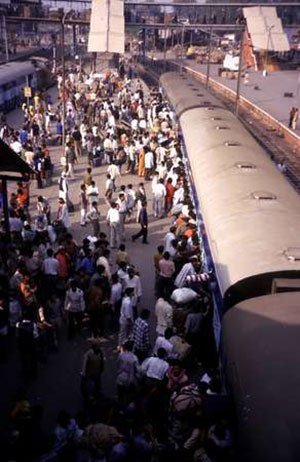Travel information India
 - Exchanging money in India : 1 dollar = 47.4 rupees (bills of 50 or 100 dollar) and 47 rupees (bills of 1,5,10,20 dollar), ATM machines are very difficult to find in India, I have only seen them in New Delhi en Udaipur. Those ATMs accepted cards connected to the Cirrus network.
- Exchanging money in India : 1 dollar = 47.4 rupees (bills of 50 or 100 dollar) and 47 rupees (bills of 1,5,10,20 dollar), ATM machines are very difficult to find in India, I have only seen them in New Delhi en Udaipur. Those ATMs accepted cards connected to the Cirrus network.- Flight to/in India : I took a cheap flight from Bangkok to New Delhi, for more information about this cheap ticket look at the travel guide Thailand.
- India climate : In november the nights get quite cold in New Delhi and Rajasthan (5-10°C), during the day it's usually sunny and a pleasant 30°C. From about 17:30 when it's already dark you need some warm extra clothes. Almost all the tourists I met had colds and bad coughs from traveling with the draughty night train, you are better off traveling in 2nd class with air condition. 2nd class train tickets are cheaper than 1st class and has the advantage that on the 3d class wagons the windows are closed, in the winter the air con is not on and the result is a nice and warm temperature in the wagon. In december and january the climate in India varies a lot. In the inland (Rajastan, New Delhi, and Pune etc ) is it during the day around 25°C while at night only 5°C which is very cold if you are staying in a simple budget place without any heating of the rooms. In Bombay the day temperature stays around 31°C and only during december the night temperature falls to about 20°C. In the second half of january the winter is already over and the temperature and humidity starts rising.
- Sending packets from India to Europe : to send a packet by land post costs about 410 rupees for a packet of 250 gram + 30 rupees per extra 250 gram. Sending a packet by air post is a lot more expensive; 450 rupees for 250 gram + 65 rupees per extra 250 gram. Do count with that some European countries also charge a tax of a minimum 10 euro per packet, even if the value of the packet is very low and the packet is sent as gift.
- Book post : this is a very cheap system for sending books out of India. To Europe it costs less than 150 rupees for sending a packet of 5kg, 88 rupees for 2kg. This is very interesting if you want to buy second hand books or sending home travel guides during a long trip (in the big cities of India are all the Lonely Planet titles available with a day of notice in advance. Since there is a risk that you have to pay a tax upon receiving your packet in Europe which in Belgium is minimum 10 Euro always send a big amount of books at the same time rather than several small packets.
- Medical help in India : The Indian pharmacies have a lot of western drugs that can be bought without prescription and are often a lot cheaper than in Europe. The sleeping pill Diazepam costs in India 5 rupees per pack of 10 pills. Also Strepsils and the antibiotic Amoxicilline are very cheap in India. A consultancy by a doctor in one of the big hospitals or at most homeopaths is for free. A consultancy by a house doctor costs 250 rupees.
- A pocket size hang lock is useful when staying in budget hotels in India, most hotels have very bad locks but slots for putting your own lock. You can also find cheap hang locks for sale in India, often of quite bad quality though.
- To travel by train : to travel by train in India is often a big adventure in itself. The trains are often full. In the news paper 'Times of India' (can be found everywhere for 2.5 rupees) you can every day on page 2 check out how full the different trains are so you know if there is any idea to try or not. Do hold Indian bank holidays and celebrations in account since the train then often get totally overbooked for days. During the month of november many Indians travel by train to see their families.
- To travel by bus in India : the busses from the private companies are very easy to find - they find you! The price and the quality differs a lot, mostly the private busses are more expensive and sometimes have less good quality than the government busses.. A tip to be sure that you are buying a ticket with the government bus is to check that there are bars in front of the ticket locket with only a small space where you have to stick the money in. Most private companies will say that they are selling tickets to the government bus if you ask, later justifying their lie with that they are a government approved company which means that they have a licence to drive passengers.
